NOTE: Any possible SBD made by this post will be donated to Jason Solomon, the host of the Solomonster Sounds Off podcast (http://solomonster.podbean.com/) an excellent, weekly pro wrestling podcast that you should check out if you're into said form of entertainment. Jason has been struck with health woes recently, and I wish to donate as much as I can. I also wanted to write something, so this seems to make perfect sense.
I will naturally provide proof of this.
People seemed to enjoy my previous post that had to do with pro wrestling, so I decided to give it another go. I will try to approach the topic in a way that is entertaining to non-fans, and the story of the blog is something that has less to do with the actual wrestling part of the equation, and moreso with the personalities of the two individuals, and the real life interactions between them, that I want to write about.
I would love for you to to find this an enjoyable and interesting read.
The story of the two men is able to capture why I enjoy pro wrestling, a form of entertainment that is somewhat riduculous on the surface, is based on a silly premise - and is fake, mostly. Sometimes, though, it's more real than just about anything on TV, and that's when it's the greatest form of entertainment in the world, to me.
I don't particularly enjoy modern wrestling that much anymore, because a lot of it has changed a lot over the years, and the idea for the blog came from a conversation I had with my friend about what it is that I love about it when I do.
This is a story about two friends who became bitter enemies, both on screen and off screen. It's also about personal growth experienced by both men that allowed them heal a wounded friendship years later.
Chapter 1: The Heroes of the Story
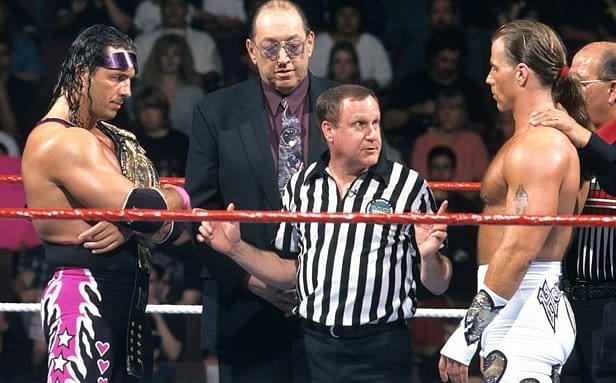
I wish to talk about two men called Bret Hart and Shawn Michaels, Bret on the left and Shawn on the right.
Professional wrestlers who are considered by many to be among the best at their chosen "sport". They are also two of my own personal favorites. Their work in pro wrestling has always entertained me a great deal, but my fandom has more to do with them as people, as men.
I won't bore you with backstories that are easy to find on Wikipedia, but a few words, I feel, are necessary to understand the two as individuals.
Bret Hart, born in Calgary to a wrestling family, son of legendary wrestler Stu Hart, dubbed "The Excellence of Execution" due to his precision in the ring and the fact that despite being physical and "snug" always respected the art of pro wrestling, which is to make it look real but never, under any circumstances, hurting your opponent. Bret has always been a vocal proponent of appreciating the skill set that goes into being a safe wrestler to work with, and in his two decade long career never even almost injured anyone.
This level of respect to the business of pro wrestling played a big part in everything Bret did. He was born in it, raised in it and never knew of any other way to approach it. Bret has also been criticized for taking the "spandex circus" too seriously at times, but personally, I have deep admiration for someone who takes his job seriously, as well as has a concern for the safety of his co-workers.
Bret was a reserved, shy guy, known for his trademark sunglasses that he wore to the ring, as well as when he was younger, every time he had to an interview segment. The sunglasses made him look cool, but the real reason for them was the fact that he was scared to death at doing talking segments due to his shyness. He was always more about being serious in the ring and doing his job the very best he could.
Growing up and although sharing Bret's respect for the pro wrestling business, Shawn Michaels was the polar opposite of Bret as a person. Shawn was a flamboyant, charismatic performer who shined in talking segments. He didn't fall short in the ring, either, however, as Bret and Shawn were widely considered two of the best of their generation, even when they were both young.
An interesting dynamic between the two is the fact that while Bret was shy in front of a crowd and Shawn was an energetic, colorful performer, their real life personas were flipped: Bret was a confident, strong, silent type, whereas Shawn, by his own admission, is an "endlessly insecure guy".
Both these personalities would play a role, and clash, during some of the most pivotal moments in wrestling history during the 90s.
Chapter 2: The Beginning of the Story
In the 80s, the World Wrestling Federation, captained by Hulk Hogan, was having a massively successful boom period, leading to sell outs, paydays, revenue, merchandise and flat out profit the likes the company had never seen before. However, a steroid scandal that accused of company owner Vince McMahon of trafficking anabolic steroids to the company's performers placed the WWF in deep waters with the federal government.

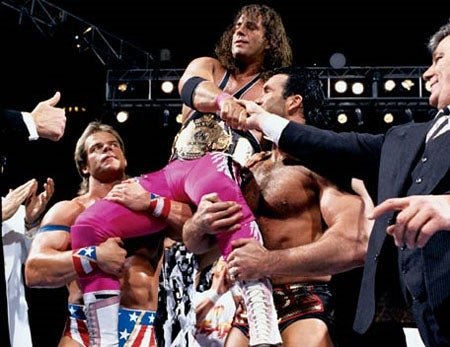
To take attention away from the scandal, from he early 90s on the WWF decided to put more focus on "smaller guys". Having previously relied on larger than life characters, muscle bound bodybuilders and steroid freaks, the WWF chose to feature Bret and Shawn, both standing at about 6 feet tall, 220-235 pounds, as the featured stars of the company. Wrestlers of this size had never been "pushed", as in placed as the big stars of the company, before.
Bret and Shawn followed similar rises to the top, with Bret being the first one to climb at the very top of the mountain. Shawn was a close number two. Both men were friendly during this time, since they shared the experience of not being seeing as the "chosen ones" by management due to their lack of size, but gained popularity due to their superb work in the ring.
Equipped with identical work ethic, the two men shared a respect for one another, something that is hugely important in a wrestling locker room. A wrestling locker room, in a lot of ways, still represents something of an old fashioned boys' club, even in today's feminized society. Honor, respect, toughness. All old fashioned male traits that are looked up to.
As a sidenote, it is also probably a big reason why I'm a fan of pro wrestling that it's one of the only forms of televised entertainment that hasn't been completely polluted with modern day social justice narratives. It still features men as men and women as women, and it's really refreshing.
Though Bret and Shawn shared similarities, their differences started to play a role as the 90s progressed.
Bret was a lot better at dealing with the fact that he was never a "chosen one", but was given the ball to run with and he did the best he could with it. Shawn, on the other hand, always had a problem with the fact that he knew that due to the fact that he wasn't 7 feet tall, he would never be the company's first choice as the face of the brand. Shawn has admitted that it's something that always bothered him, even when he had success, in the back of his mind he had a frustration that grew as time went on.
Bret and Shawn were both obsessed with the wrestling business, but in slightly different ways.
In wrestling, the good guys and bad guys are known babyfaces and heels, respectively. Bret took pride in being the company's top babyface, the hero that fans, especially kids, could look up to. He took his character very seriously, and wanted to send a positive message of perseverance, not giving up, working hard and leading a good life with positive values. Bret has always been proud to share stories from his fans saying that they were in bad palces in their lives, but an interview from Bret gave them the positive encouragement they needed to get through whatever hardship they were faced with.
Shawn's obsession was to be the top guy. Shawn grew up a wrestling fan, dreaming of making it to the top, while knowing that not being a steroid freak would always be something that stands in the way of him accomplishing this dream. The more frustrated Shawn got, the nastier he became to his co-workers, slowly earning a reputation as a pretty miserable a-hole. He popped pills, tried to "politic" his way into the main event and didn't mind stepping on people on his way to get there. Always a professional in the ring, though, never missing a step, no matter how many pills he took. Shawn was a single guy with only the goal of being the top star of the World Wrestling Federation on his mind.
A lot his co-workers have shared in interviews that Shawn was an absolute prick to deal with backstage, with his only redeeming factor being that he was one of the best wrestlers that they had ever seen, no matter how hard it was to stand him behind the curtain.
Though being #2 to Bret's #1, Shawn always remained respectful to Bret, perhaps due to knowing that Bret, as a smaller wrestler, had paved the way for Shawn to some day be #1, as well. Bret, on the other hand, respected Shawn for his outstanding performance in the ring. So, the two were friends and got along.
Chapter 3: The Iron Man
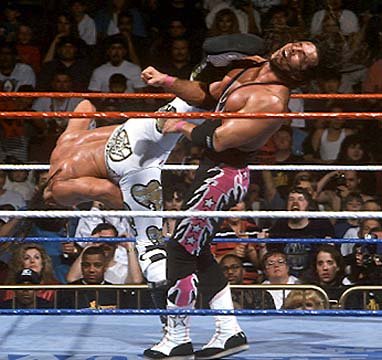
The story starts to pick up around 1996.
Bret Hart had been working as the company's top draw and was the reigning World Wrestling Federation champion. While Bret Hart was working hard as the champion, putting on classic matches with everyone he was put in the ring with, the company had slowly started to position Shawn as the next guy. Having previously worked as a heel, a bad guy, Shawn had been turned into a babyface, like Bret, which of course put Bret's position as the main hero in doubt, and Bret knew this.
Shawn had started to become popular as a hero character, but Bret, being a professional, promised to support Shawn as the company transitioned into treating him as number one - on the surface. Underneath, Bret was admittedly hurt that his work and effort as the champion had been somewhat ignored, as the WWF's marketing machine had started to focus on making Shawn.
Shawn and Bret were scheduled to face each other at the company's annual WrestleMania event, the biggest Pay Per View event of the calendar year for the WWF, with Bret dropping the WWF title to Shawn, crowning him as the top star.
Due to the mutual respect for each other's abilities in the ring, the two men wanted to showcase that wrestling can be more than steroided muscle jocks, and pushed an idea to do an "Iron Man" match.
The concept being that the match lasts 60 minutes and the winner would be the guy with the most falls in the 60 minute time limit. This would allow them to really work hard, push each other and create a story in the ring that would be unlike anything that had ever really been seen before in the WWF. There were other wrestling companies, especially prior to the 90s, that would have 60 minute matches, but typically a main event wrestling match would last from 10 to 20 minutes tops.
There was a lot of from from management that a 60 minute match would fail at capturing the fans' imaginations, but Bret and Shawn promised to deliver, being confident in their abilities.
This brings me to something that I appreciate about professional wrestling, and something that probably goes totally unnoticed to non-fans, who are only vaguely familiar with the concept of two men in tights having a pre-determined fight.
Contrary to popular belief, the matches aren't choreographed move for move beforehand. Instead, the wrestlers communicate with each other in the ring, both with words and with body language, crafting a story that controls the crowd reactions and engagement. The fact that you're able to keep a crowd engaged in a wrestling match for 60 minutes is a tremendous feat, even if it happened 20 years ago, before smartphones and short attention spans created by YouTube and cat memes.
The story of the match was that the two men knew each other and were evenly matched, and neither man had the advantage for a long period of time. Every time Shawn would get on the offense, Bret would counter it, and every time Bret got on the offense, Shawn would counter it. Both men also did things they hadn't done before, just to outdo the other guy. The 60 minute time limit expired at 0-0, forcing an overtime, which then saw Shawn Michaels emerge victorious.
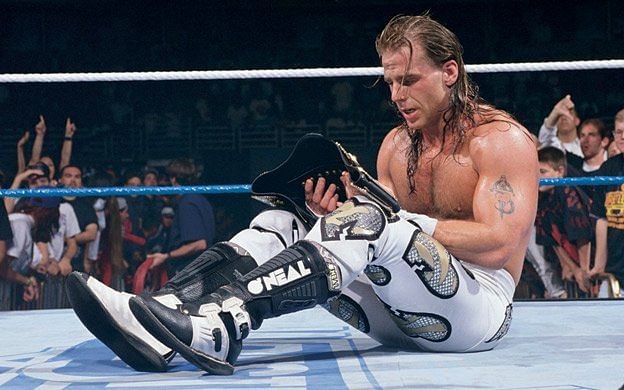
Shawn's boyhood dream of becoming the WWF champion had come true, and his professional life was at its absolute peak. His personal life, however, started to crumble after this very moment in time.
Bret, having worked nonstop with no vacations since 1984, took an extended break after WrestleMania, leaving Shawn to prove himself as a top guy, without Bret.
This was the first thing to cause friction between the two, since the WWF was in a bad place around that time, and Shawn felt that Bret, who was a major star, left Shawn alone to fail. Since Shawn had been a supporting player for Bret for many years, Shawn felt that Bret should have showed him similar support in return.
After his title victory celebration, the honeymoon was quickly over for Shawn and it became time to truly be the big star he always dreamed of being.
Unfortunately, television ratings, attendances and revenue suffered during Shawn's reign on top, and the pressure of carrying the company as its top draw started to mount, leading to Shawn's personality and drug issues to get worse. Almost on one who worked with Shawn during this time period has anything positive to say about Shawn, other than the fact that working a match with Shawn guaranteed that you had the best match of the night because he was that good.

Shawn took on a crazy schedule, worked like a madman in the ring every night, no matter whether there were 2,000 or 20,000 fans in attendance. He flew, he ran, he bumped, he wrestled like he was in someone else's body and did things that no sane person would even attempt. All the while business suffered.
This wasn't all Shawn's fault, however. The company as a whole had been stuck in the past in their ways of producing television, and the competing company, WCW, was producing fresh, cutting edge television on the other channel.
Not to mention the fact that two of Shawn's closest friends Scott Hall and Kevin Nash, also big stars in the company, accepted offers from the rival WCW, leaving Shawn without his buddies, and the company with even less star power to bring in the business.
Shawn never slowed down, and it was no doubt a result of his insecurities, and his hunger for approval, both from management and the fans. As well as a result of the chip on his shoulder that he had for Bret not being there to support him.
It was perhaps unfair of Shawn to blame Bret, since, he had been working with chronic injuries for the better part of 12 years, and felt like he needed a break to heal. Shawn just wasn't in a mindset that would allow him to see Bret's side of it.
Shawn's frustrations were multiplied by the fact that during his hiatus from the ring, Bret gave interviews criticizing Shawn's performance as the champion. This is where it starts to get interesting.
You see, while the in ring action is "fake", and Bret was giving "fake" interviews that were designed to sell the eventual rematch to the fans, Bret did insert subtle jabs here and there that could be interpreted as "real" comments towards Shawn.
In wrestling, the fake, make-believe part of it is called "kayfabe"; everything that is not real, also known as "shoot", is kayfabe. The term "kayfabe" was invented back in the day, when it was a big secret that wrestling was fixed, in order to protect the business, so that when people in the business were discussing the business, using the term kayfabe, people not in the know wouldn't know what they were talking about.
A big theme in the upcoming chapters is how it's sometimes hard in wrestling to differentiate between real and kayfabe, especially in the case of Bret and Shawn.
As previously stated, Bret did have some bitterness towards the fact that he had been kicked to the curve in order to make Shawn a star, even though he had been working extremely hard as champion. He also probably took some pride in the fact that the business went down during his time away. This, of course, made Shawn agitated because, in his eyes, Bret left just to see Shawn fail, so that he could come back and say "I told you so".
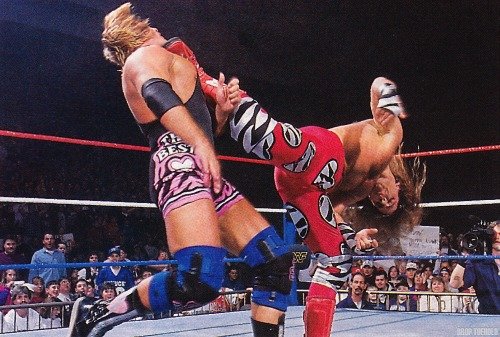
Chapter 4: The Bitter Ex Hero
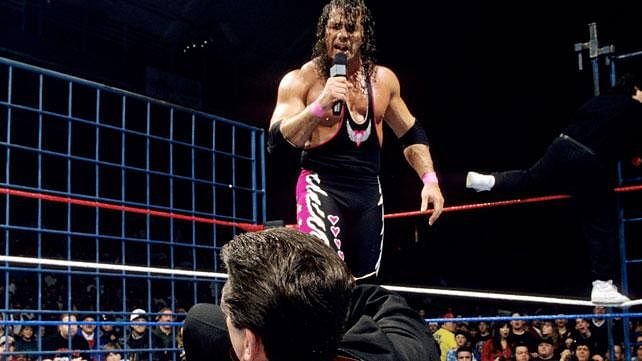
In the fall of 1996, WWF owner Vince McMahon, feeling threatend by the competing WCW, offered a lucrative, unprecedented 20 year contract to Bret Hart, which would ensure that Bret would spend the rest of his career working for the WWF, in one form or another. Bret did have talks with WCW president Eric Bischoff during the time, but never seriously entertained the idea of jumping ship, since he felt the WWF was his home and that WCW would never use his character right. And since the integrity of his character was of utmost importance to Bret, he signed the contract offered to him by the WWF.
Shortly afterwards, he was ready to make his comeback to the company.
When Shawn dropped the WWF title Bret at WrestleMania, it was always the plan for Shawn to return the favour at the following year's WrestleMania, with a third match happening down the line with Shawn getting the decisive victory in the series.
Obviously, I wouldn't be writing this blog if things had gone down smoothly, now would I?
When Bret returned to the company in late 1996, the WWF was a different company. Having moved slowly towards a more edgier product, to compete with the edgy WCW, wrestling traditionalist Bret Hart didn't feel quite as comfortable with the product as he had felt previously. It was also clear to Bret that he wasn't the top guy now, Shawn was.
With Shawn feeling abandoned by Bret after winning the championship, there were clear frictions in the friendship between the two.
What makes it interesting is that, in storyline, Bret was supposed to feel bitter after losing to Shawn at WrestleMania, and Shawn was supposed to be antagonistic towards the former champion due to his lack of faith in the company's new top man and direction.
The two would engage in verbal battles, live on television, that were in the context of the storyline, but since the storyline mirrored real life, they would work in legit verbal punches at each other, with neither party being able to tell whether they were real or kayfabe.
Even though it feels a bit dirty to find entertainment in the legit problems of others, it did make for absolutely exciting television when you had two guy with real heat and beef with each other, with live microphones on live television, unedited and unscripted. Nowadays, wrestling is overly scripted to a depressing degree, but back in those days, you were given promo time of X amount of minutes and certain key points you had to hammer home to move the story along, but the rest was up to the wrestlers.
This is where wrestling is unlike anything else, and I will shamelessly defend it.
It's not a scripted daytime drama with completely made up characters, it's not reality TV, it's.. wrestling. Wrestling is this completely unique animal that allows two guys to air their dirty laundry on national television, and while you know that it's storyline, when there's an element of reality in it, it's must see, because you can never tell what's real and what's kayfabe.
Even if you didn't know the whole backstory of everything, you could just see it in their faces that something was up, because no one is that good of an actor - especially since neither man was a professional actor, they were wrestlers.

Putting further exacerbation in the relationship of the two wrestlers was the fact that a month prior to 1997's WrestleMania event, where the plan for Shawn to do the honors and return the belt to Bret in a rematch, Shawn suffered what he called a career threatening knee injury - one which Bret called to doubt. The injury forced Shawn to vacate the WWF title, basically freeing him from losing it to Bret in a return match, as had been promised to Bret. Shawn claimed that the injury was legitimate, but according to Bret, he doesn't buy it to this day, and instead saw it as a way for Shawn to weasel out of the match, just to screw with him.
No one but Shawn really knows what the story is, he still claims that it was legit, but his doctor has stated in an interview that while Shawn did suffer a knee injury, he didn't see it as serious as Shawn made it out to be, so there's that.
Shawn was also known for faking injuries before to get out of losing matches. Even though he was a professional in the ring, he would act totally unprofessionally backstage if things didn't go his way.
It was around this time that it was safe to say that Shawn and Bret were no longer friends, as the animosity between the two seemed to grow as each day passed.
Bret also started to feel unhappy at his job, as the company's creative direction started to sway farther from his preferred style of wrestling. But also the fans were starting to change. Previously, the fans had supported the smiley heroes who would save the day, but society had started to change in the late 90s, and fans were growing tired of the black and white good guy and bad guy setting. Instead of cheering for the hero Bret Hart, fans started to gravitate towards a new superstar in Stone Cold Steve Austin, who was supposed to be a bad guy, cursing, being an unnecessarily violent, merciless, remorseless a-hole who had no respect for anybody. A classic villain, in theory.
With Shawn out of the picture, Bret was inserted in a rivalry with Austin, culminating in a match at WrestleMania.

Even though the match was a total Plan B, as a result of Shawn's injury, it turned out to be one of the most important matches in wrestling history.
I'm bringing it up because it, again, encapsulates the beauty of pro wrestling, when it's good.
Bret went into the match as the babyface, while Austin entered the match as the heel. But after the match, the two men had flipped alignments, accomplishing something that is called a "double turn", which is rare, because it's hard to pull off.
The match stipulation was an "I Quit" match, meaning that the match as won by making the other guy say "I Quit".
The story of the match was the two men hitting each other with everything but the kitchen sink, with neither man giving an inch. During the match, Bret clearly worked as a subtle bad guy, with Austin getting the "hero" spots where he showcased heart and unwillingness to quit, even though Bret was painted as the superior wrestler. Austin fought back with heart and guts.
The ending of the match came in a spot where Bret had a bleeding Austin in a submission hold that Austin could not escape from, but refused, refused and refused to give up. Finally Austin was knocked out with the pain and Bret was declared the winner, even though Austin never gave up.
The crowd was clearly upset at Bret being the victor. This was, of course, all orchestrated by Bret who commanded the flow of the match, with the intent of making Austin out to be the hero. It's again an art form that is never appreciated by people who think wrestling is just a silly pre-determined circus - which it is, most of the time, to be fair. But when it's done right, when it's professionals in there they can work magic that can't be done in other entertainment avenues. The live, improvised theater that plays with people's emotions is fascinates me more than any movie, really. And that's not a knock on movies, they've just never been my thing since I discovered wrestling at an early age.
The match won several Match of the Year awards, and was undoubtedly Bret's way of outperforming everybody out of spite after everything that had gone down.

The next night on TV, Bret officially embraced his new bad guy character, turning on the fans for cheering for a guy like Austin and daring to turn on a hero like himself, who, in his eyes as well as the character's eyes, had done nothing but set a positive example to the fans for years.
Bret was uneasy about the prospect of turning heel at first, because he had been the good guy hero for so long, but also saw it as an opportunity, since Shawn at the time was still the big babyface, so Bret could then become the #1 villain.
His heel character was almost identical to his real life persona at the time: a bitter, disillusioned former hero, who had been unfairly abandoned by the fans. The interesting thing is that Bret turned on the American fans. He still remained a Canadian hero, as well as a worldwide hero elsewhere. Whenever the WWF would perform in front of a Canadian, or any other non-American crowd, Bret would be cheered like he was Wayne Gretzky in his hometown crowd during the NHL playoffs - and then in America, he would be booed mercilessly. This setting convinced Bret to turn heel, since he wouldn't have to sell out the character's integrity, since the character would still be "in the right", it was just the American fans who were "wrong" in who they wanted to cheer.
Chapter 5: The Montreal Screwjob

Bret was now a villain, while Shawn returned from his perhaps real-perhaps not knee injury during the spring, and for all intents and purposes was to remain a good guy, which should have given both guysroom to breath as they weren't competing for the same spot.
This was unfortunately not the case.
Both Bret and Shawn went on to make interviews and appearances, taking shots at each other, stemming from the fact that Bret never bought Shawn's knee injury and Shawn was defensive about it.
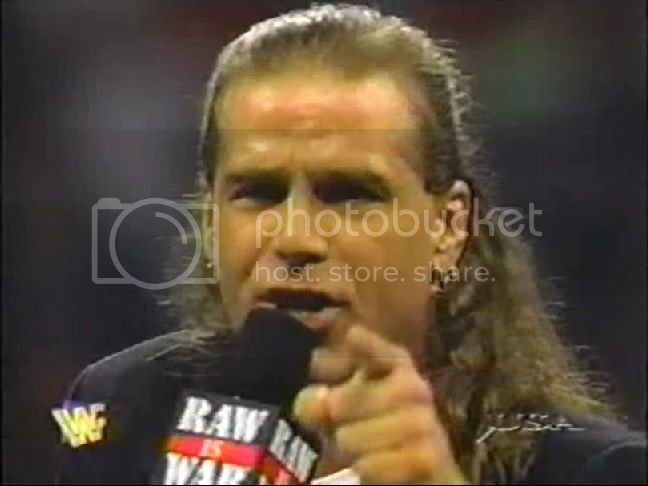
This resulted in a segment on the WWF's television show where Shawn would take "real" personal shots at Bret for the things he had been saying. Even calling into question Bret's perceived persona as a traditionalist family man, saying: "I've seen you on the road, jack, and you ain't no role model!" insinuating that Bret cheated on his wife, which actually was the case.
This obviously did not sit well with Bret, who was very protective of his image as a reliable, old fashioned husband. Whether it was completely true or not wasn't even the point, the point was the he was all about setting a good example.
It all came to head later that spring when Shawn made another similar comment.
The story here is that both Bret and Shawn were close to a female performer called "Sunny". It's also a common belief that both Bret and Shawn were "more than friends" with Sunny. In an interview segment, Shawn said to Bret that "I know that lately you've been having some Sunny days", which didn't resonate at all with the fans watching, and was completely intended to be a personal punch at Bret.
This was the straw that broke the camel's back for Bret, since it lead to marital problems with him and his wife, who was watching the show and understood what Shawn was getting at with the comment.
Backstage, Bret confronted Shawn about the comments, to which Shawn replied with something sarcastic and obnoxious, which lead to Bret finally taking a swing at Shawn, and the two came to blows. They had to separated by other wrestlers and backstage officials, but not before Bret pulled out a chunk of Shawn's front hair, which never grew back and Shawn still sports a noticeable bald spot where the hair used to be.
After the altercation Shawn briefly quit the WWF, noting "unsafe working environment" as his reasoning. In reality, he was trying to get out of his WWF contract to jump ship to WCW, where his good friends were big and influential stars.
Shawn was legally unable to get out of his contract, however, and returned to work shortly thereafter.
To pour even more gasoline to the flames, it was decided for Shawn to also go heel.
This didn't please Bret at all, since he was now once again being overshadowed by Shawn, since Bret had been the #1 bad guy. Bret also felt that since he had spent the past months as a villain, lambasting American wrestling fans, he couldn't possibly go back to being a good guy character. He felt he was in limbo: he couldn't be an effective good guy or an effective bad guy.
Also around this time, Vince McMahon told Bret that the company was in financial dire straits; it was taking too big of a hit from the competition, and couldn't afford to pay Bret's lucrative 20 year deal that Bret had signed a year earlier. Vince told Bret that out of respect for him, he wants Bret to negotiate a deal with WCW, trying to get as much money from them as possible.
Bret had no intentions of leaving the WWF, due to the reasons stated above: he knew that WCW would not know how to use him, would not understand his character and he always felt that WWF was his home. However, with everything going down the way it had with Shawn, Bret decided to negotiate with WCW, after giving it thought.
This leads to an incident in pro wrestling that has been written about more than anything else, ever. The JFK assassination of pro wrestling.
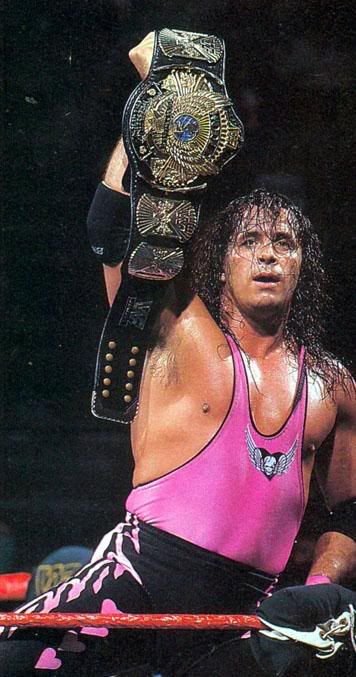
In the summer of 1997, during the same event where Shawn Michaels turned heel, Bret became the WWF champion for the fifth time.
This meant that Bret was the reigning WWF champion when Vince told him to negotiate with WCW. The contract that Bret had signed a year earlier stated that Bret had "reasonable creative control over his television character". A clause that Bret had never used, since he was an old fashioned professional who would do what he was told, even if he didn't like it.
However, when he agreed to sign with WCW, still the WWF champion, it became time for him to drop the title.
In a rematch with Shawn Michaels.
Now, in wrestling whenever a wrestler is to leave a company, be it to join another company, retire, whatever, the tradition is for the leaving wrestler to "lay down", to give the win to a wrestler who remains with the company, making him look strong, "putting him over", as is said in wrestling lingo. It's designed to "transfer", if you will, the star power to the guy who continues to perform with the company.
The tensions between Shawn and Bret were at a boiling point, unfortunately, and the chairman Vince McMahon was dead set on having the rematch between Bret and Shawn as Bret's final match, with Shawn regaining the WWF championship.
Prior to this, Shawn had made a comment to Bret that he would "never do the job to Bret". In wrestling, "doing the job" means losing.
This upset Bret, since the idea of doing the job to Shawn, who had just disrespected him by saying that he would not do the same, felt wrong to him. Remember earlier when I sad that respect is something that is paramount in a wrestling locker room?
What made matters worse is that the match was set to take place in Canada, where Bret was respected national hero. Bret felt like he couldn't lay down to this disrespectful jacka** in front of the people who looked up to him as a hero.
He, then, decided to play his creative control card, stating that he's open to anything - except losing to Shawn Michaels at the Survivor Series event in Montreal.
Bret was even open to losing the title the next night on TV, just not to Shawn, not at the Survivor Series event.
They went back and forth and back and forth and back and forth with every single possible, conceivable idea of getting Bret to drop the title to Shawn, while looking as good as possible in the process, but Bret declined every one of them. He was not budging: he was going to enforce the legal right, granted to him by the contract he had signed, to NOT lose the WWF title to Shawn Michaels at Survivor Series, in Montreal.
For Vince McMahon, the problem with Bret dropping the title the next night was that his contract would have had expired by then, and there was a risk of Bret showing up at the competition's television show as the unbeaten WWF champion, which would have been a PR disaster for the WWF.
Finally, they agreed that the match at Survivor Series would end in a non-finish, a draw, with Bret retaining the title and then giving it up the next night on TV.
This was the story given to Bret.
The match took place in Montreal, November 9, 1997, in front of an audience of 20,593 Canadian Bret Hart fans, who saw Bret take on his fierce rival one more time.
Prior to the match, Bret recalls that he and Shawn actually had a "nice little chat" when they went over what they wanted to do in the match, threw around ideas of how to do stuff, and so on. Everything seemed cool. Bret has said that he felt good about the match, even felt relatively good about Shawn who had shared a moment that felt a bit like their old friendship.
This would take a drastic turn during the match.
The match was actually really good, and even though their was animosity between the two men, they worked professionally, with neither taking any cheap shots or hurting the other. Less professional guys would have no doubt come to blows in a setting like this.
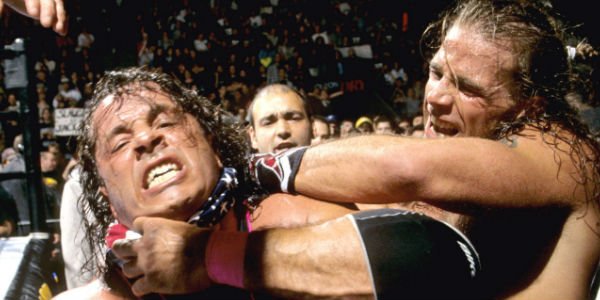
Everything seemed to go well and smooth, until the very end.
The plan was for Shawn to put Bret's own "finishing maneuver", a submission hold hold called the Sharpshooter on Bret, and then have Bret reverse it, and continue on with the match.
The spot went as planned - except as soon as soon Shawn locked in the ring Sharpshooter, Vince McMahon appeared at ring side and yelled at the referee to "Ring the damn bell!"

As soon as the bell rang, the referee sprang out of the ring and out of the arena into a taxi that was waiting for him. Bret, realizing what had just happened, stared at Vince McMahon, who after Bret had given his life and body to his company for 13 years, wrestling injured, wrestling sick, wrestling hurt, only taking one extended hiatus during that whole time, had just screwed him, lied straight to his face and disrespected him in the worst way possible.
Vince McMahon screwed him. For real. This was not a storyline, it was the most real thing on television.

But it wasn't just Vince who screwed Bret, Shawn also screwed Bret.
In wrestling, and Bret has talked about this, you can always assume that the office will try to screw you. The office will always treat you like a circus animal, sucking any possible profit it can out of you, and then spitting you out like old chewing gum that has lost its flavor.
But you never expect it out of a co-worker. The respect and trust among co-workers is paramount, and even in the middle of the heated rivalry, on screen and off screen, that Bret and Shawn were in, Bret always assumed that he could trust Shawn in a situation like that. Never, he has stated, would he have expected for Shawn to be in on something like that, even if he did have a feeling that something like that might happen from the management's part.
The fact that someone would care so much about the outcome of a fake wrestling match is something that can be difficult to understand, it sort of is even more me, and I'm a fan. But you have to take into account the fact that Bret had been a loyal employee for his boss and someone who used to call Shawn Michaels his friend. Someone who trusted both men, had sacrificed for both men, and even though he had issues with both men near the end, he never imagined that they could lie to him like that.
Imagine forking for a company for 13 years, taking one vacation, no sick leaves, nothing, aways doing what you're told, always giving it your all and then basically being told "f*ck you" on your very last day. Stuff like that hurts, and the fact that it's over a fake wrestling match changes nothing.
I think this is a pretty good part to end the already extremely long Part I. If you stuck with it, I appreciate it a lot. This will be followed with a Part II, since this wasn't the final chapter in the story of Bret Hart and Shawn Michaels. I can spoil it a little bit and promise a happy ending.
I said earlier that I respect both men deeply. I don't have political heroes, I don't have entrepreneurial heroes, but if I had to name two heroes, they would be Bret Hart and Shawn Michaels. Yes, they were fantastic entertainers and performers in the business of professional wrestling, but their actions during this part of the story does leave a lot to be desired, especially Shawn's - however it's actually events that occur after this part that makes me respect them as human beings.
More on that later.
Sources:
Bret Hart: My Real Life in the Cartoon World of Wrestling, autobiography.
Shawn Michaels: Heartbreak and Triumph, autobiography.
Image sources: 1, 2, 3, 4, 5, 6, 7, 8, 9, 10, 11, 12, 13, 14, 15, 16, 17
Really liked your style! Following you!
Hah. Ironically, Bret was good friends with a lot of midget wrestlers, dating back to the 70s and 80s. There was some tremendous midget athletes - and also, "midget wrestler" is not a derogatory, they themselves called each other back then. Bret talked about in his podcast some months ago that some of the midget wrestlers he knew back in the day would put on amazing matches.
What a history piece here!
Happy you liked it!